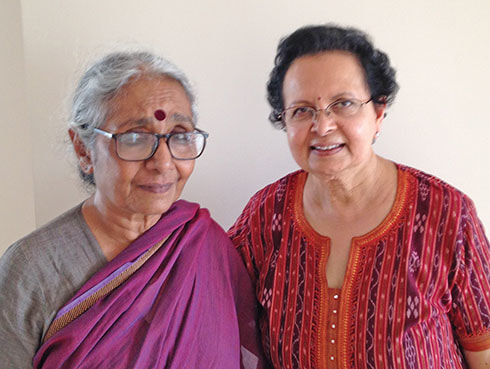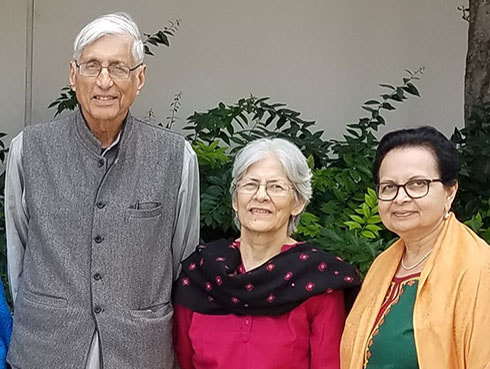
BY DEVIKA C. MEHTA
POMONA, CA - The Ahimsa Center at California State Polytechnic University here held a three-day international conference on ‘India@Seventy: Building a More Inclusive Democracy’ between November 3-5, featuring a select group of eminent scholars, educators, thought leaders, and social activists drawn from the US, India,
POMONA, CA - The Ahimsa Center at California State Polytechnic University here held a three-day international conference on ‘India@Seventy: Building a More Inclusive Democracy’ between November 3-5, featuring a select group of eminent scholars, educators, thought leaders, and social activists drawn from the US, India,
the United Kingdom and Israel. The conference was organized and hosted by the Center’s Founder and Director, Prof Tara Sethia.
Welcoming the gathering was Provost & Vice President, Academic Affairs, Cal Poly Pomona Sylvia Alva and Interim Associate Dean Erika DeJonghe. They focused on the important work of the Ahimsa Center in taking this occasion of India@Seventy to reflect on the significance of inclusion in democracies around the world.
Addressing the gathering Prof Sethia said that since its independence 70 years ago, India has made spectacular progress on many fronts, and its democracy stands out as not only the largest in the world, but also one that is among the most stable. Yet serious inequalities, social tensions and frequent instances of intolerance continue to threaten India’s democracy.
Therefore, she underscored the goal of the conference was to examine the nature and roots of these problems and to identify promising solution. She invited the speakers, who came from many different disciplines and fields of knowledge, to offer their insights on the challenges Indian democracy faces today and how such challenges can be addressed to make it stronger and more inclusive.
The inaugural session featured Rajmohan Gandhi, a grandson of Mahatma Gandhi who spoke about the lessons we can draw for today from the leaders of India’s freedom movement such Gandhi, Nehru, Sardar Patel, Ambedkar and Maulana Azad. Mrinalini Sinha from the University of Michigan; Ornit Shani from the University of Haifa, Israel; Aishwary Kumar from Stanford University; Karuna Mantena from Yale; Anastasia Piliavsky from Cambridge and Aseema Sinha from Claremont McKenna College also spoke.
The second day began with an address by one of India’s most respected social activist, Aruna Roy, who is best known for her leadership role in the enactment of two path-breaking laws—the Right to Information and the Right to Food. She emphasized the importance of Gandhian values of nonviolence and tolerance of differences. The afternoon keynote was delivered by, Hiram E. Chodosh, the President of Claremont McKenna College about the challenges facing India’s legal system. He suggested how mediation can provide a partial solution for the massive logjam of cases in the courts in India today.
Other presentations of the day were by Akhil Gupta and Purnima Mankekar from UCLA; Jyoti
Bachani from Saint Mary’s College of California; Rajni Bakshi, author and journalist from Mumbai; Eleanor Newbigin from the University of London; Amit Ahuja from UC Santa Barbara; Prakash Keshwan from the University of Connecticut; Elyse Petersen,a social entrepreneur form Las Vegas, and Devesh Kapoor from the University of Pennsylvania.
Other highlights of the conference included documentaries on Mahatma Gandhi and B. R.
Ambedkar, a sitar concert by Srinivas Reddy from Brown University, and a dialog session with
Rajmohan Gandhi for K-12 educators. The conference concluded on Nov 5 with a robust dialog among all speakers and attendees to translate the presentations over the previous two days into an action plan for strengthening Indian democracy. This discussion was moderated by Prof Sethia, who concluded the conference by illuminating its global significance by acknowledging the fact that around the world democracy today faces a crisis of confidence which can be overcome by properly marshalling the power of trust and deliberation among its rich and extraordinarily diverse population. She suggested, “India can build a more inclusive democracy at home and help resurrect faith in democracy abroad.”
Welcoming the gathering was Provost & Vice President, Academic Affairs, Cal Poly Pomona Sylvia Alva and Interim Associate Dean Erika DeJonghe. They focused on the important work of the Ahimsa Center in taking this occasion of India@Seventy to reflect on the significance of inclusion in democracies around the world.
Addressing the gathering Prof Sethia said that since its independence 70 years ago, India has made spectacular progress on many fronts, and its democracy stands out as not only the largest in the world, but also one that is among the most stable. Yet serious inequalities, social tensions and frequent instances of intolerance continue to threaten India’s democracy.
Therefore, she underscored the goal of the conference was to examine the nature and roots of these problems and to identify promising solution. She invited the speakers, who came from many different disciplines and fields of knowledge, to offer their insights on the challenges Indian democracy faces today and how such challenges can be addressed to make it stronger and more inclusive.
The inaugural session featured Rajmohan Gandhi, a grandson of Mahatma Gandhi who spoke about the lessons we can draw for today from the leaders of India’s freedom movement such Gandhi, Nehru, Sardar Patel, Ambedkar and Maulana Azad. Mrinalini Sinha from the University of Michigan; Ornit Shani from the University of Haifa, Israel; Aishwary Kumar from Stanford University; Karuna Mantena from Yale; Anastasia Piliavsky from Cambridge and Aseema Sinha from Claremont McKenna College also spoke.
The second day began with an address by one of India’s most respected social activist, Aruna Roy, who is best known for her leadership role in the enactment of two path-breaking laws—the Right to Information and the Right to Food. She emphasized the importance of Gandhian values of nonviolence and tolerance of differences. The afternoon keynote was delivered by, Hiram E. Chodosh, the President of Claremont McKenna College about the challenges facing India’s legal system. He suggested how mediation can provide a partial solution for the massive logjam of cases in the courts in India today.
Other presentations of the day were by Akhil Gupta and Purnima Mankekar from UCLA; Jyoti
Bachani from Saint Mary’s College of California; Rajni Bakshi, author and journalist from Mumbai; Eleanor Newbigin from the University of London; Amit Ahuja from UC Santa Barbara; Prakash Keshwan from the University of Connecticut; Elyse Petersen,a social entrepreneur form Las Vegas, and Devesh Kapoor from the University of Pennsylvania.
Other highlights of the conference included documentaries on Mahatma Gandhi and B. R.
Ambedkar, a sitar concert by Srinivas Reddy from Brown University, and a dialog session with
Rajmohan Gandhi for K-12 educators. The conference concluded on Nov 5 with a robust dialog among all speakers and attendees to translate the presentations over the previous two days into an action plan for strengthening Indian democracy. This discussion was moderated by Prof Sethia, who concluded the conference by illuminating its global significance by acknowledging the fact that around the world democracy today faces a crisis of confidence which can be overcome by properly marshalling the power of trust and deliberation among its rich and extraordinarily diverse population. She suggested, “India can build a more inclusive democracy at home and help resurrect faith in democracy abroad.”




 RSS Feed
RSS Feed
